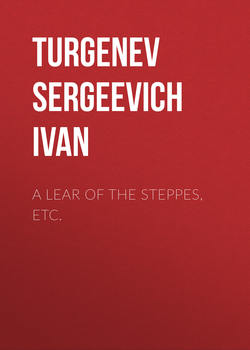Читать книгу A Lear of the Steppes, etc. - Иван Тургенев, Тургенев Иван Сергеевич - Страница 6
A LEAR OF THE STEPPES
IV
ОглавлениеAnd yet even this self-confident, unflinching giant had his moments of melancholy and depression. Without any visible cause he would suddenly begin to be sad; he would lock himself up alone in his room, and hum – positively hum – like a whole hive of bees; or he would call his page Maximka, and tell him to read aloud to him out of the solitary book which had somehow found its way into his house, an odd volume of Novikovsky’s The Worker at Leisure, or else to sing to him. And Maximka, who by some strange freak of chance, could spell out print, syllable by syllable, would set to work with the usual chopping up of the words and transference of the accent, bawling out phrases of the following description: ‘but man in his wilfulness draws from this empty hypothesis, which he applies to the animal kingdom, utterly opposite conclusions. Every animal separately,’ he says, ‘is not capable of making me happy!’ and so on. Or he would chant in a shrill little voice a mournful song, of which nothing could be distinguished but: ‘Ee … eee … ee … a … ee … a … ee … Aaa … ska! O … oo … oo … bee … ee … ee … ee … la!’ While Martin Petrovitch would shake his head, make allusions to the mutability of life, how all things turn to ashes, fade away like grass, pass – and will return no more! A picture had somehow come into his hands, representing a burning candle, which the winds, with puffed-out cheeks, were blowing upon from all sides; below was the inscription: ‘Such is the life of man.’ He was very fond of this picture; he had hung it up in his own room, but at ordinary, not melancholy, times he used to keep it turned face to the wall, so that it might not depress him. Harlov, that colossus, was afraid of death! To the consolations of religion, to prayer, however, he rarely had recourse in his fits of melancholy. Even then he chiefly relied on his own intelligence. He had no particular religious feeling; he was not often seen in church; he used to say, it is true, that he did not go on the ground that, owing to his corporeal dimensions, he was afraid of squeezing other people out. The fit of depression commonly ended in Martin Petrovitch’s beginning to whistle, and suddenly, in a voice of thunder, ordering out his droshky, and dashing off about the neighbourhood, vigorously brandishing his disengaged hand over the peak of his cap, as though he would say, ‘For all that, I don’t care a straw!’ He was a regular Russian.
